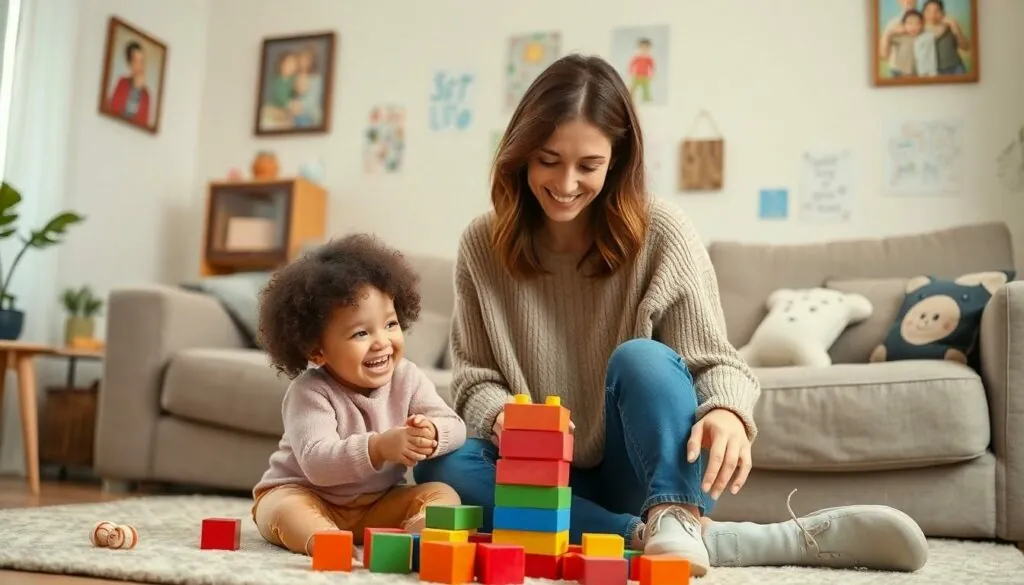Table of Contents
ToggleNavigating the world of parenting can feel like trying to assemble IKEA furniture without instructions. For those embarking on this journey, understanding the difference between solo parenting and single parenting is crucial. While both terms might sound similar, they each come with their own unique challenges and rewards.
Understanding Solo Parenting
Solo parenting refers to a situation where one parent raises a child independently, often without involvement from a co-parent. This scenario includes those who share custody but primarily handle daily tasks alone.
Definition of Solo Parenting
Solo parenting defines a situation in which one parent assumes full responsibility for raising children, without the support of a partner. Individuals in this role may take on additional challenges, such as balancing work and parenting. Solo parents often navigate daily responsibilities independently and make all decisions regarding their children’s upbringing. This parenting style can arise from various circumstances, including long-term separation or the loss of a partner.
Characteristics of Solo Parenting
Solo parenting features several unique traits that differentiate it from other parenting styles. Independence stands out, as solo parents manage all child-rearing tasks alone, from school pickups to extracurricular activities. Flexibility in decision-making often manifests in choosing how to raise children and what values to instill. Emotional resilience becomes crucial, as solo parents frequently encounter challenges without additional support. Moreover, resourcefulness is essential; parents learn to juggle schedules and finances effectively.
Understanding Single Parenting

Single parenting involves raising children without a partner. This situation can arise from various circumstances, including divorce, separation, or the choice to parent alone.
Definition of Single Parenting
Single parenting refers to a scenario where one parent raises a child without the support of a second parent. This can happen in various contexts. Some single parents may share custody, yet they carry out the majority of daily responsibilities alone. Others may not have regular contact with the other parent. Single parenting encompasses a broad range of experiences, but it always centers on the dedication of one parent to nurture and care for their child.
Characteristics of Single Parenting
Single parenting has unique traits that highlight its challenges. Independence features prominently as single parents manage all aspects of their children’s lives. Flexibility becomes essential, allowing parents to adapt their schedules to meet their children’s needs. Emotional resilience plays a crucial role, as these parents often face difficulties without a partner’s support. Resourcefulness thrives in this environment, with parents finding creative ways to balance work and family life. Building a strong support network can also contribute to navigating the demands of single parenting effectively.
Key Differences Between Solo Parenting and Single Parenting
Solo parenting and single parenting differ in several significant ways. Understanding these nuances is essential for those navigating these paths.
Support Systems
A solo parent often lacks a co-parent, resulting in limited external support. They may handle daily responsibilities independently without a corresponding partner. Single parents, conversely, may have a broader support network that includes friends, family, or even ex-partners who share custody. The availability of emotional and practical support often shapes their parenting experiences. Solo parents frequently develop self-reliance, while single parents can lean on their support groups for assistance.
Responsibilities and Challenges
Solo parenting presents unique responsibilities as one parent manages all aspects of child-rearing. This situation may lead to overwhelming challenges due to the absence of shared duties. In contrast, single parents might share some responsibilities, even if they are the primary caregiver. Single parents often face challenges related to co-parenting dynamics, such as communication with an ex-partner. Both parenting styles require emotional resilience, yet the context of challenges often differs. Solo parents navigate decisions independently, while single parents may need to consider co-parenting agreements.
Pros and Cons of Each Parenting Style
Both solo and single parenting offer unique advantages and challenges, influencing the overall parenting experience.
Benefits of Solo Parenting
Solo parenting promotes autonomy, allowing a parent to shape their child’s upbringing according to personal values and beliefs. Flexibility in decision-making also emerges, enabling a parent to adapt to changing circumstances more easily. Emotional resilience develops, as solo parents often learn to manage challenges independently. Building self-reliance is crucial, since solo parents frequently juggle multiple responsibilities. Time management skills improve, fostering a strong ability to balance work and family life effectively. These experiences enhance problem-solving capabilities, empowering solo parents to tackle issues head-on.
Benefits of Single Parenting
Single parenting fosters a supportive network, which can provide emotional and practical assistance. Shared responsibilities with an ex-partner, where applicable, lighten the load, allowing single parents to navigate parenting duties more easily. Flexibility in scheduling often arises, adapting to different arrangements or commitments. Emotional growth frequently occurs through overcoming obstacles, building strength in adversity. Stronger relationships can develop with children, as single parents invest significant time and attention in their lives. Combined parenting strategies may also enrich a child’s experiences, providing diverse perspectives and care styles.
Understanding the differences between solo parenting and single parenting is essential for recognizing the unique challenges each presents. While both styles require emotional resilience and resourcefulness they cater to different circumstances and support systems. Solo parents often navigate their journey independently without a co-parent’s involvement. In contrast single parents may benefit from a broader network that offers shared responsibilities and emotional support.
Ultimately both parenting styles shape the experiences of raising children in distinct ways. Acknowledging these differences can empower parents to embrace their circumstances and find effective strategies that work best for their families.




